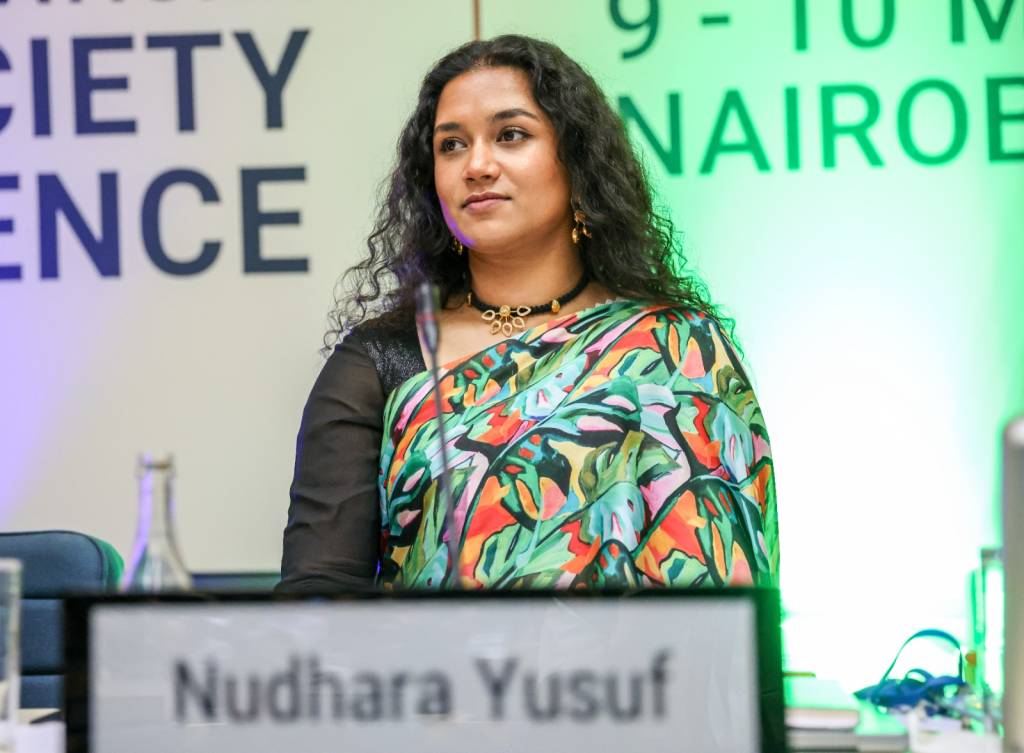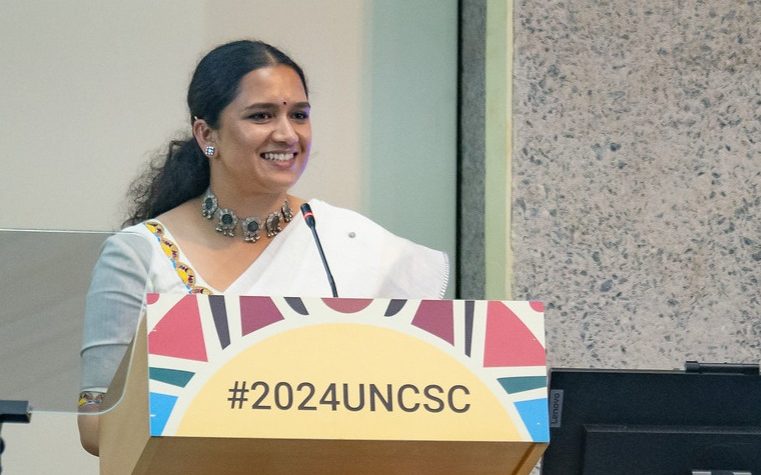INTERVIEW | Why I am Optimistic About SOTF Process Leading to Reform of Multilateral System
Nudhara Yusuf, Executive Coordinator of the Global Governance Innovation Network (GGIN) at the Stimson Center and Co-Chair of the 2024 United Nations Civil Society Conference in support of the Summit of the Future (SOTF), speaks about the viability of current multistakeholder efforts for the reform of the multilateral system.

Newspage: You described the 2024 UN Civil Society Conference (2024 UNCSC) as “momentous” in your post-conference reflection piece. How momentous was it considering the fact that it was organised on short notice yet received a huge turn-out and active participation of stakeholders from government and civil society?
Yusuf: The UN civil society conferences have been happening for several years, yet the 69th edition of the conference was, in my view, “momentous” in a couple of different respects.
Firstly, unlike the previous 68 conferences, it was the first to be tied to an intergovernmental process — it was explicitly in support of the Summit to the Future (SOTF). Secondly, it was the first conference to take place in the Global South, particularly in Africa–a region with potential for highest impact and influence in the future. Thirdly, it was planned within the shortest notice a planning committee has ever had to plan for such a conference.
Unlike previous conferences that had taken almost a year of planning, this one was planned within barely nine weeks. Carole [Osero-Ageng’o] and I were only appointed co-chairs in the middle of February, then the co-chairs for the planning subcommittees came on board in the third week of February. Moreover, this was the first UN civil society conference where we saw other stakeholder groups like Member States and UN entities showing up in full force. We also had a large representation of non Department of Global Communications (DGC) and Economic and Social Council (ECOSOC) accredited NGOs (49.6%).
I believe this was crucial because, by and large, we are realizing that civil society talking to itself (and often privileging those based in New York) will not achieve the urgent impact we need for the future of multilateralism. And if we are to engage with the intergovernmental processes, if we are to engage with cross-sectoral processes, we really need to start convening beyond ourselves, which made the conversation at the 2024 UN Civil Society Conference a step in the right direction.
Newspage: One of the crucial components of the conference was the ImPact Coalitions (ICs), which you also described as reinventing how civil society engages with intergovernmental processes. How crucial were the ICs to the overall success of the conference?
Yusuf: The ICs were fundamental to the thought process behind the conference. From the very beginning, we wanted to think differently regarding how civil society engages with intergovernmental processes. Civil society has engaged with the SOTF process through more traditional routes, including providing inputs on the revisions and recommendations as well as engaging in the usual stakeholder dialogues with Member States. This is critical and continues to be a primary course of action for stakeholder input.
However, in considering how we could make 2024 UNCSC add another form of value, we decided to bring together in the same room different stakeholders involved in the SOTF processes and leading thoughts on specific reform issues and actions. We therefore brought the UN entities, civil society, academics, grassroots activists, think tanks, and other stakeholders working on specific reforms together to self-organise on their way forward. That was what this conference could do differently.
Even groups of Member States champions were part of the process and that is the idea behind the ICs, which were not meant to be a parallel structure created to replace existing ones. Essentially, the ICs are a support system for action-oriented work that Member States want to champion in the SOTF process and its implementation to follow.
Newspage: what are you doing as co-chairs of 2024UNCSC to ensure the Nairobi conference’s bold recommendations are reflected in the outcome of the SOTF?
Yusuf: We created the ICs to ensure that, beyond recommendations, there are actual networks or actors working to achieve the desired reforms in a manner that is self-organised and action-oriented. We are not going to be prescribing anything to anyone. The mandate of the planning subcommittee co-chairs officially ended on May 31, 2024, with our final post-conference civil society townhall.
Afterward, Carole and I were mandated to connect Nairobi to New York from May through September. We will therefore be working with the ICs to support the SOTF process by providing assistance to ICs when requested; however, it is still going to be self-organised. We are encouraging the ICs to engage strongly with the Summit of the Future action days. We know that many also plan on convening regularly before then.
We are keen on ensuring that civil society’s output from the conference is reflected in the SOTF process itself. Equally, we do not want Member States to think that this is the only way civil society can contribute to the process, so that they will also engage with different stakeholders and their own civil society constituencies at the national level.
Newspage: How do you imagine the outcome of the SOTF considering the general sense of pessimism about the multilateral system?
Yusuf: I am a researcher who has been involved in researching the processes around the Summit of the Future for quite some time and published several reports about it through the Stimson Center and other platforms. There are a couple of things to keep in mind about why the Summit should be taken seriously, and we should expect and push for concrete outcomes from it.
The biggest challenge facing the SOTF process, and also the reason for its need, is the context we live in globally today, which is potentially more strained than it has ever been. Whether you are talking about peace and security, the humanitarian situation, global power dynamics, international finance as well as digital technology and the opportunities and risks it presents – the situation is now more complex, tense and strained than it has ever been in history.
It is nothing like the 1945 post-war optimism that led to the creation of the UN. It is also beyond the 51 countries that were in San Francisco for the creation of the UN in 1945; the UN now has 193 member countries. I really think the SOTF is about the countries that were not in San Francisco in 1945. It is not going to be easy to achieve the 2030 Agenda for Sustainable Development, but it is important to indicate that our multilateral systems are capable of doing so.
The Summit of the Future is a moment for us to regroup, build trust among Member States and rebuild trust in the multilateral system, since people are losing hope about whether the UN is fit for the purpose and can indeed be effective. So, the SOTF is an important signaling moment to say this is a system that still functions, and it is a system that is still able to tackle the challenges that we will inevitably face in the future. This, of course, requires Member States and stakeholders at large to commit to providing multilateralism with the tools to do so.
This overarching message should be the absolute key outcome of the SOTF because, on the one hand, this is an ambitious moment, but on the other, it is a saving grace moment for multilateralism. If we do not do it now, I do not think we can do it in the future.
Newspage: Like you said, a lot of people are pessimistic about UN reforms; do you think the UN and other multilateral institutions of the world could be reformed?
Yusuf: I wouldn’t be in this line of work if I didn’t believe they could be reformed. Yet, realistically speaking, we will never be able to create an institution like the United Nations or the World Trade Organisation (WTO) again. This is because it requires the coming together of hegemonic superpowers to create; whether the process is just or otherwise. Given our current trajectory of increasing multipolarity, we are unlikely to ever create such global institutions again.
Frankly speaking, they are all we have and all we are going to have. The alternative is that we start creating multiple clubs of multilateralism that will end up pitting us against each other, creating different rules of the game and fostering forum shopping. To achieve the Sustainable Development Goals (SDGs), we need to view multilateralism beyond just the nation state and beyond just domestic policy.
We need to come together as a global community to tackle global issues by believing in reform of the UN, WTO and global financial architecture. And the more and more we realise this very stark reality: they are all we have got and that other options are not going to work, the more energy and political will we will have for the reform of these institutions to eventually break the gridlock that currently prevails.
Editor’s Note: This interview has been edited for length and clarity
















